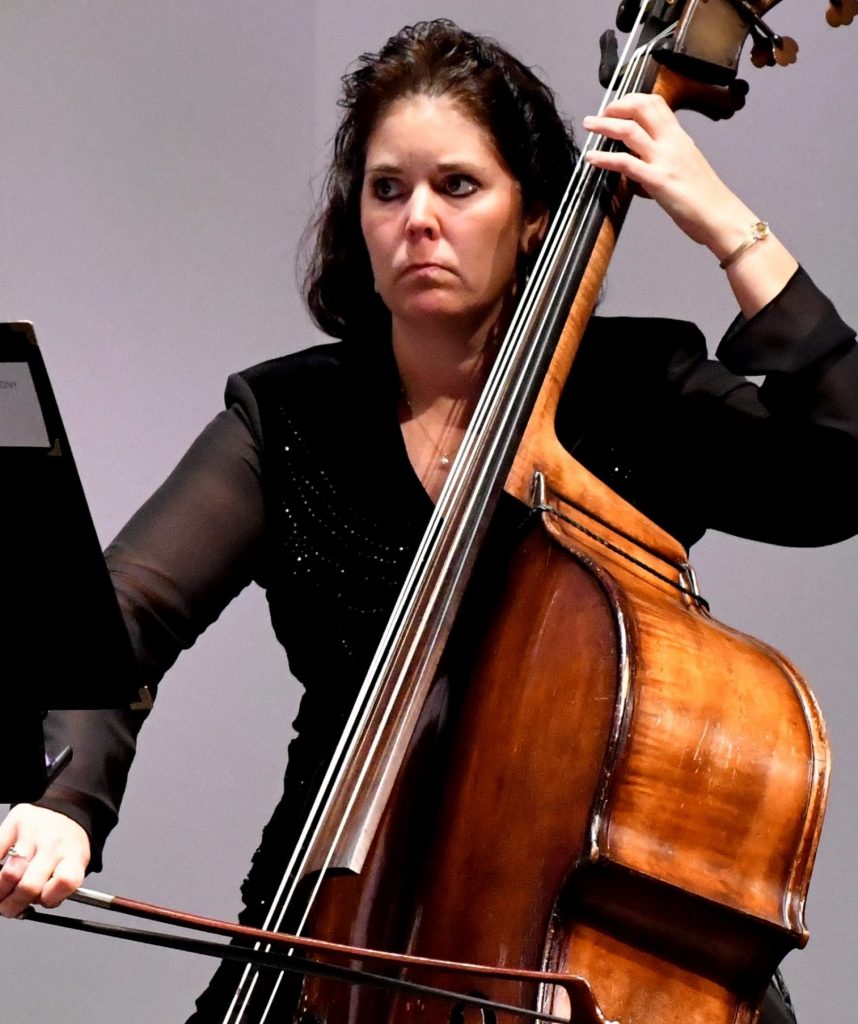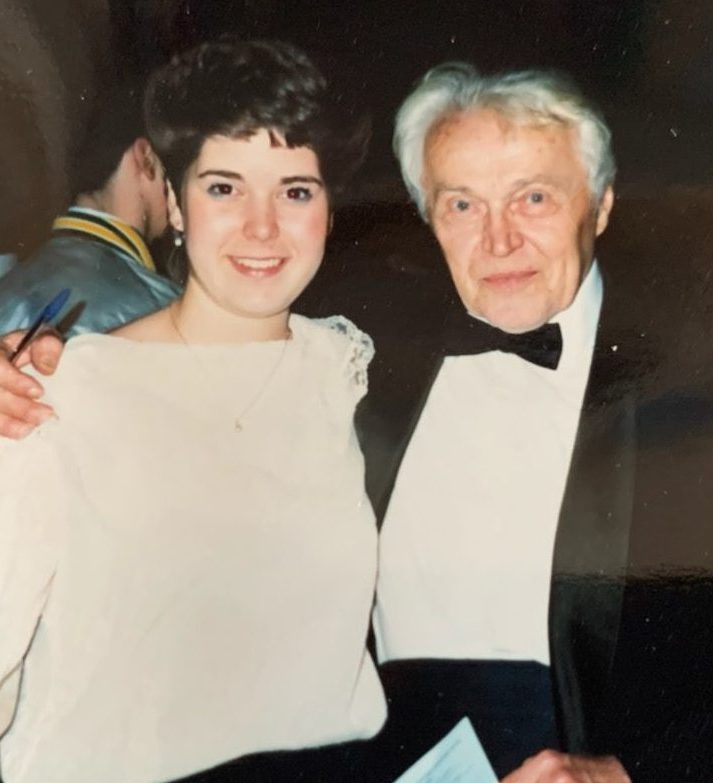‘A Recovering Perfectionist’
July 24, 2020
The Gulf Coast Symphony’s Principal Bassist Doni Landefeld Finds a Groove in Florida

While other kids were making a few bucks delivering newspapers or babysitting, the Gulf Coast Symphony’s Principal Double Bassist Doni Landefeld was performing as a high schooler in a professional orchestra and doing paid gigs around town.
And today, besides laying down a mean musical bassline, the Pennsylvania native has been helping the orchestra and leaders in other organizations strengthen prospects for the future. But more about that later.
Doni Landefeld grew up in Bethlehem, PA., where there weren’t many third graders who would attend their first orchestra concert and fall for as unwieldy a hulk of wood and wire such as the double bass. But our Doni did. “I was just enamored by that big beast of an instrument. It was kinda neat. I really wanted to play it.”
Two weeks later, her parents presented Doni with a half-size base, which still was pretty big. “I couldn’t carry it around. They had to hire a middle schooler to carry it for me.”
Doni quickly improved on the bass in elementary school and was invited to join the regional junior string orchestra. In high school, she landed the area’s youth symphony orchestra and the local youth honors concert band. And as a high schooler, Doni also performed with the nearby Moravian College symphony.
Indeed, childhood Doni unleashed a torrent of music. By junior year, she was recruited into the Allentown Symphony, a professional orchestra. Doni suspects her teacher at the time, Dominick Fiore, put in a good word for her. And she was up to the task. “I remember feeling a bit intimidated, but I held my own for the most part.”
After graduation, Doni headed 170 miles west to Penn State’s main campus at State College on a full scholarship to study music. She earned a BS degree in Music Education and a performance certificate in double bass.
At Penn State, Doni played in all the ensembles open to her. But one in particular won her heart: the university’s Mozart Orchestra. “I attribute much of who I am as a musician today to that ensemble. We would almost strictly play Mozart symphonies, concertos, sonatas, also Haydn. It just really trained my ear.”
Still, the Big Show was never far away. Doni left the Allentown Symphony when she moved to Penn State. Yet she quickly found professional groups in and around State College. At one point, Doni was playing for pay concurrently with the Nittany Valley Symphony, the Pennsylvania Center Chamber Orchestra and the Altoona Symphony. That was besides the Penn State ensembles and the coursework required for her degree.
“I was busy. I had some days when I was on the go from 8 am to 10 pm. Classes would start at eight. Those would take up the day until the university ensembles started rehearsing at 4 pm. The professional groups would start up around 7 pm.”

A Change in Course
Just before graduation in 1994. Doni realized that while her degree would be in music education, she didn’t want to teach children music. “I call myself a recovering perfectionist. And I just couldn’t see teaching and delivering at a level I thought necessary to teach kids. I saw myself more as an administrator.”
Doni also knew the rigors of being a professional musician, if she were to choose that route. “I realized I’d be eating, sleeping, breathing and practicing music, let alone performing, all day. It was going to be super competitive and really difficult to make it.”
So, she swapped her post-graduate acceptance into the music performance program at Philadelphia’s Temple University for a place in that school’s masters program in educational leadership.
Once she completed her masters in 1996, Doni became head of student services at DPT Business School, a local Philadelphia business college. Doni was there five years, during which she also played double bass with the Abington Symphony, a volunteer orchestra, and did small paid music gigs. By the time she left DPT, Doni had risen to Director of Education.
In 2000, Doni’s doctor husband Nathan secured a position in Reading, PA. He and Doni would live in Reading for 3 ½ years. Once there, she found employment at a two-year career college called the Schuylkill Institute of Business and Technology, in Pottsville.
At Schuylkill, Doni rose to become Dean, commanding a staff of as many as 60 people. But she stayed only a couple years. “That was the darkest time of my life. That is when I got out of music for a while. I got myself really busy and eventually burned out with work.”
Doni was working 12-hour days at Schuylkill on top of an hour commute to Pottsville. She was 30 years old, and it was about time to start a family. “I did a little soul searching and decided I had been working too hard and was too stressed and tired.” So, she turned down a promotion to Executive Director and quit to find work closer to Reading. Oh, and she promptly did start a family.
What Doni found closer to home was a five-unit apartment building she and Nathan bought as an investment. Doni, with son Teddy still in the works, tried her hand at managing the apartments. “In retrospect, it was a great experience. But it was something we would never ever do again. It was a nightmare.”
April in Paradise
Then in April 2003, it happened. A multigenerational family holiday in Naples, FL, was proposed by Nathan’s parents. Doni and Nathan weren’t excited by the prospect of a Florida escape. “We thought: ‘Why Florida. It’s just Disney World. And it’s where everybody goes to retire. But we caved and decided to do it.”
You can guess what happened next. “We get to Naples, and we’re thinking: ‘Oh my God, why didn’t we do this sooner.” You see, Doni and Nathan are outdoors people. And the great outdoors is outdoors the whole year in Florida, especially for avid fishers and boaters such as the Landefelds.
Doni says that soon after that vacation, Nathan cold-called Physicians Primary Care in Fort Myers about any openings. Two weeks later, he got an offer and is a senior pediatrician there today.
So the Landefelds emigrated to Florida, eventually selling the dreaded Reading apartment building while here. Phew! “Work and weather is what brought us to Florida. Our only regret is that we didn’t do it sooner,” Doni says.
Settling in Cape Coral, Doni tried being a stay-at-home mom, but got bored. (Not your fault Teddy). So, she opted for a return to school, this time for a doctorate in organizational psychology. That’s where Walden University stepped in, allowing Doni to earn her PhD remotely and online. “That Walden program was really intense and vigorous,” she says. Altogether, it took just 4 ½ years to earn her doctorate.
But where was the music? Doni thought about picking up the bow when she arrived here. “I thought: ‘It’s a clean slate. Let’s start up again.’” She inquired about the Gulf Coast Symphony but decided to hold off while pursuing the doctorate and caring for infant Teddy. She reached out again to GCS Music Director Andrew Kurtz in 2008, as work on the Ph.D. was winding down. “He was very receptive, and the rest is history.”
“Leadership is the capacity to translate vision into reality.”
Warren Bennis
Meanwhile, Doni caught interest in the field of coaching entrepreneurs. She undertook some training, and a year later, hung out her shingle. “In coaching, you leverage psychology to capitalize on your clients’ strengths and help them find the best path forward. It’s not like consulting where you tell someone what to do. Rather, you help people realize what they want and can do.” Doni works with individual entrepreneurs, leaders at larger organizations and — we now suspect — her GCS double bass colleagues. She is currently developing virtual coaching applications for the post-pandemic world.
Ten years ago, Doni became President of the Board of the Gulf Coast Symphony. During her time in office and under the leadership of Maestro Kurtz, the GCS has broadened its scope and improved markedly in performance quality. “One reason we are truly where we are is that Andrew and I collaborate effectively and share the same vision and really care about the organization.”
Back 2008, the orchestra played a limited number of concerts annually — a few pops concerts at Barbara Mann Arts Hall in Fort Myers and the rest scattered around at high schools and other venues. In recent years, however, the GCS has performed upwards of 16 concerts a year at 1,800-seat Barbara Mann, entertaining thousands of concertgoers.
It also has run a musical outreach program for area youngsters that includes instrument lessons and children’s concerts. The GCS also sponsors other community programs and events. Its budget has grown from about $200,000 annually 10 years ago to $2.1 million in 2020. And despite COVID-19, the GCS this month began a generational transformation into a hub for music performance and education, as well as for the arts in general, in Lee County.
Perfect.
By Art Mooradian

